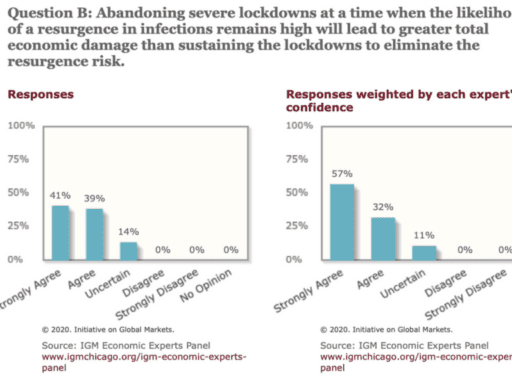There’s very little support for “opening up” the economy early among experts
President Trump’s musings about ending social distancing measures early in order to boost the economy have sparked a robust debate in the media about the wisdom of that idea.
But according to a new poll of leading economists from the University of Chicago’s Booth School, there is very little support among experts for the idea that officials must chose between saving lives through continued social distancing and saving the economy by ending the practice.
Instead the overwhelming majority of the economists they surveyed warn that “abandoning severe lockdowns at a time when the likelihood of a resurgence in infections remains high will lead to greater total economic damage” than keeping the lockdowns in place and riding things out.
/cdn.vox-cdn.com/uploads/chorus_asset/file/19857003/Screen_Shot_2020_03_29_at_12.11.31_PM.png)
Of course the mere fact that the IGM Chicago poll says this doesn’t make it true. But it’s worth underscoring that there is no evidence of a disjuncture in views between what public health experts think and what economic policy experts think.
To the extent that economists dissent from the current course of public policy action, they do so in two ways.
One, the same poll shows a widespread belief that Congress has not done enough to invest money in the actual health care system as opposed to income supports for people losing their jobs. Lawmakers argued on a bipartisan basis for this sort of income support, passing a landmark stimulus bill meant to help the unemployed Friday. But economists argue lawmakers need to focus on bolstering the health care system because ultimately only more tests, more hospital capacity, more treatments, and eventually a vaccine will let us put these problems behind us.
/cdn.vox-cdn.com/uploads/chorus_asset/file/19857063/Screen_Shot_2020_03_29_at_12.12.36_PM.png)
A second point is that several members of the panel endorsed an argument made by Harvard econometrician James Stock that America’s testing capacity is not currently being used in the right way to inform policy. Current practice is to focus testing where it is most diagnostically useful in a medical sense — on people who seem to be sick, and on people whose background characteristics make them exceptionally at risk for severe Covid-19 symptoms.
Stock’s point is that to assess the tradeoffs involved in non-pharmaceutical interventions like closing businesses, we really need to do some random testing of the population so that we can understand how many people get infected without becoming seriously ill. That would allow us to get a better handle on the true rate at which infected people require ventilators which in turn would allow us to calculate the optimal course of policy more correctly.
Of course, this is difficult to accomplish at the moment because of a lack of tests and the needed facilities and equipment to process them. More — and more rapid — tests are on their way, however, which would allow policy makers to more seriously consider Stock’s proposal.
Stock and his supporters aren’t saying the lockdowns are an overreaction, but they are saying that the current approach to testing doesn’t allow us to really know for sure whether or not they are.
But there is broad agreement among economists that there is no economic gain to be had by opening up businesses if that allows the virus to overwhelm health care system capacity in the way we’ve already seen in Wuhan, Lombardy, Madrid, and now New York. The only real question is whether we have an adequate handle on exactly where the line is between extreme social distancing and allowing business to continue as normal.
Author: Matthew Yglesias
Read More



